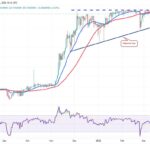In a significant development for the cryptocurrency landscape, Coinbase, a leading U.S. cryptocurrency exchange, is reportedly in advanced talks to acquire Deribit, a prominent global crypto derivatives exchange. This news, sourced from Bloomberg, suggests that both companies have informed Dubai regulators about their discussions, an essential step given Deribit’s licensing in the region.
Deribit is making headlines not just for its potential sale, but for the impressive scale of its operations. The exchange has been acknowledged for its dominance in the crypto derivatives market, expecting to reach a staggering trading volume of nearly .2 trillion in 2024, which would mark a notable increase from the previous year’s figures. This contrasts sharply with Coinbase’s established position predominantly in the spot trading sector, highlighting the strategic shift that an acquisition could represent.
“Bloomberg earlier hinted that Deribit could be valued between billion to billion, a valuation that underscores the exchange’s significant role in the evolving crypto market,”
With this potential acquisition, Coinbase aims to solidify its foothold in the lucrative derivatives arena, opening new avenues for revenue and product offerings. As the cryptocurrency industry continues to evolve with innovative financial products, this move could mark a pivotal moment for both companies and their ambitious aspirations.

Coinbase’s Potential Acquisition of Deribit: Key Points
The recent reports on Coinbase’s acquisition discussions with Deribit could have significant implications for investors and crypto enthusiasts. Here are the key points of this development:
- Advanced Acquisition Talks: Coinbase is in advanced discussions to acquire Deribit, a leading global crypto derivatives exchange.
- Regulatory Transparency: Both companies have informed Dubai regulators, highlighting the importance of compliance in the crypto industry.
- Valuation Insights: Deribit could be valued between billion to billion, indicating a strong market position and potential future profitability.
- Market Expansion: This acquisition would mark Coinbase’s entry into the lucrative crypto derivatives market, which is significantly more profitable than spot trading.
- Projected Trading Volume: Deribit is expected to handle nearly .2 trillion in trading volume by 2024, which is almost double the previous year’s figures.
This move could significantly impact Coinbase’s market presence and provide users with diverse trading options.
Understanding these dynamics is crucial for readers who are interested in the evolving landscape of cryptocurrency trading and investment opportunities.
Coinbase’s Strategic Move: Acquisition Talks with Deribit
In a significant development within the cryptocurrency sector, Coinbase is reportedly engaged in discussions to acquire Deribit, a powerhouse in the crypto derivatives market. According to credible sources like Bloomberg, this move could position Coinbase as a formidable competitor in a sector that has recently demonstrated exceptional growth, with projected trading volumes greatly surpassing previous years. This potential acquisition highlights Coinbase’s ambition to diversify its offerings beyond its traditional spot trading framework.
Competitive Advantages: By acquiring Deribit, Coinbase stands to gain not only access to a burgeoning market segment but also the expertise and technological infrastructure of an established derivatives player. This strategic pivot could enable Coinbase to capture a share of the estimated .2 trillion trading volume projected for the derivatives market in 2024, thereby significantly enhancing its revenue streams. Given Deribit’s reputation and regulatory compliance in Dubai, this acquisition could also improve Coinbase’s global footprint, fostering international trust and expanding its customer base.
Disadvantages and Challenges: However, the acquisition is not without its hurdles. The valuation of Deribit, estimated between billion to billion, poses a challenging investment for Coinbase, which may face scrutiny regarding its financial decision-making amid volatile market conditions. Regulatory complexities could arise as well, given the diverse regulatory environments governing crypto activities worldwide. Additionally, there is competition from other players—like Kraken—which may also seek to enhance their own market positions through similar acquisitions or strategies.
This development could especially benefit institutional investors and larger traders who have been waiting for Coinbase to expand its offerings in the derivatives space, tapping into the more advanced trading strategies these products often provide. Conversely, individual investors and smaller players might find themselves sidelined as larger entities jockey for position in a rapidly nationalized market. If successful, Coinbase’s acquisition moves could intensify competition, making it more challenging for smaller exchanges and platforms to sustain their business models.















